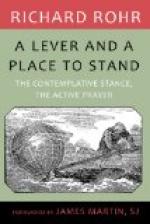“You will come and see us at the hotel,” Mrs. Gorham said, warmly seconded by Alice. “Won’t you dine with us to-morrow evening? Mr. Gorham will be glad to hear about you from yourself.”
To-morrow evening seemed far away to Allen, so he supplemented Mrs. Gorham’s invitation by a suggestion that they take a motor ride with him the following afternoon, which brought the time of their meeting that much nearer.
For some little time after Allen’s machine had disappeared Alice and Mrs. Gorham continued their drive in silence, and it was Patricia who spoke first.
“Isn’t he the grandest thing?” she remarked. “He’s just like one of King Arthur’s knights. And he called me ‘Lady Pat.’”
“You dear child,” Eleanor cried, impulsively pressing the little form to her.
“That is exactly what I ought to be,” Alice said, abruptly. “Just think how pleased father would be.”
“What ought you to be that you are not, my dear?” Mrs. Gorham inquired, surprised.
“Why, a boy like Allen just ready to start off on a business career. That’s about the only disappointment father has ever experienced, not having a son to succeed him. You know as I do how much it would mean to him to ‘found a house,’ as he calls it. I’ve seen him looking at Pat and me so many times with an expression in his eyes which I understood, and it has hurt me all through that I couldn’t have been the son he longed for. The aggravating part of it all is that nothing interests me so much as business. I must have inherited father’s love for it. I adore listening to him when he is discussing some great problem with Mr. Covington. It seems to me the grandest thing in the world to be able to influence people, and to create or expand industries and actually to accomplish results.”
Mrs. Gorham understood the girl’s mood and knew that it was wiser to let her run on without interruption.
“I don’t feel the same about other things,” Alice continued, pausing from time to time as she became more introspective. “I’m fond of poetry, of course, but I can’t understand how any one can be satisfied to do nothing else but write poems; I admire art, but with my admiration for the artist’s work there’s a real pity for the man because he is debarred from the world of action. If I were a man I would have to do something which had a physical as well as an intellectual struggle in it, with a reward at the end to be striven for which was not expressed alone in the praise of the world—it would have to be power itself.”
“I would rather be a damosel,” Patricia put in.
“You are your father’s own daughter, Alice,” Mrs. Gorham said, as the girl ceased speaking. “You could not be his child and feel otherwise.”
“But that makes it all the harder,” Alice rebelled. “It doesn’t give me any chance to do the things I want to do. I must
’Sigh and cry And still sit idly by.’”




